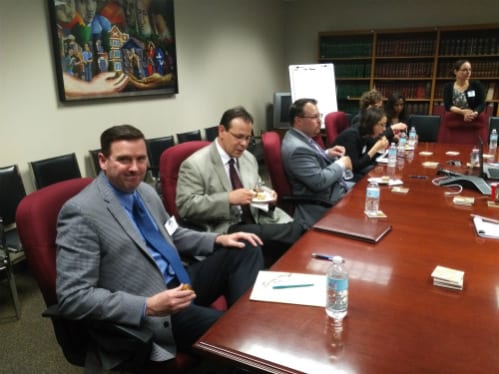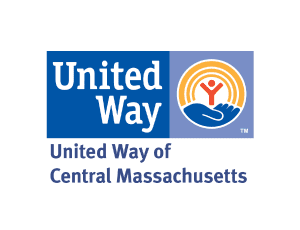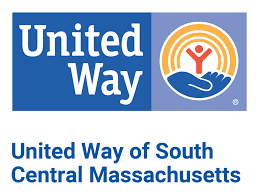
May 25, 2017
Attorneys describe “life changing” pro bono work
WORCESTER, Mass.—“Each of these stories is life changing,” Kate Eshghi, General Counsel and Senior Vice President of UMass Memorial Health Care, said. “Each has a tremendous impact on the wellbeing of families and their long-term health.”
Eshghi was speaking at a May 19 lunch held at Community Legal Aid’s (CLA) offices and sponsored by the Medical-Legal Partnership between UMass Memorial and CLA. At the lunch, attorneys who have handled cases pro bono for the MLP described their experiences to attorneys who are interested in becoming involved in pro bono work.
Katie McDonough, a Western Massachusetts-based private attorney who previously worked for Chase Bank in Manhattan, spoke of a child she represented for the MLP. In the case she advocated for “an incredible mother” fighting to get her child the support he needed in the public school system.
McDonough’s client was autistic and has delayed development in his speaking skills. When McDonough first met her young client’s mom, the six year old had only a 20-word speaking capacity. His mother, who speaks limited English, had signed off on an Individualized Education Program, or IEP, that only allowed for two 15-minute sessions per week of speech therapy, which McDonough saw as a “gross injustice.” The mom knew her son needed more services for her son, which education law provides for, but she didn’t know how.
“It can be very intimidating” for a mother to sit with school professionals and push for the services she needs, McDonough said. While the mother was an “incredible advocate,” having an attorney support her made a big difference: with McDonough’s help, the student got the services he needed, including five-days weekly of speech therapy. “It was a happy ending to the story,” McDonough said.
While the situation was intimidating for the mother, it was also intimidating for McDonough. “I don’t know a thing about special education!” was her first reaction when asked by the MLP to take the case. However, the partnership promised to mentor her in special education law throughout the case—and does the same for each attorney who takes on a pro bono case.
“Without Nickie, I wouldn’t have been able to do anything,” McDonough joked, referring to Nicole Cardamone, the CLA education attorney who acted as her mentor. Still, McDonough said of the negotiations with the public school system, “Wall Street negotiating can come in handy with them.”
Attorney Lisa Neeley of Mirick O’Connell, a large law firm that is home to a number of attorneys who have offered their services to MLP clients as well as others referred by CLA, agreed that CLA’s mentors were helpful, especially for newer attorneys and those doing pro bono work outside their normal area of practice. “Mass Health,” she said, “is an extremely challenging complex area of law, even for providers.”
Other attorneys present spoke highly of the MLP and of doing pro bono work in general. Carlos Nicolas Formaggia, who two years ago became the MLP’s first volunteer, said, “I felt that I was completely supported and having a mentor was great. It is very satisfying.”
Terrence Briggs, a partner at Bowditch & Dewey, agreed that the work is satisfying. Professionally he focuses on cases that “are interesting because you do them and get to know them,” but that don’t offer “real human contact.” He described a pro bono case he took on as “rewarding.”
Healthcare providers are often the first to notice that a client has a health-related need that can’t be addressed with medicine, but “that can only be addressed by legal professionals.” For example, a provider might notice a child has special needs, and realize that they are not being met at school. The MLP provides the opportunity for these providers to refer families for legal help.
The MLP, which is similar to such partnerships across the country and was recently recognized for its quality work by the Legal Services Corporation, began when doctors in the pediatric asthma unit of the UMass Memorial Healthcare system noticed a need. Practitioners are working to build, in Eshghi’s words, “expertise in our clinical team to help identify the social determinants of health.”
“You’re talking to people at their most vulnerable moment, you listen to what they share, and they open up to you,” said Natasha Rodriguez, UMass’s Ambulatory Care Coordinator. “How do we help them pick up the pieces get those pieces together?”
MLP coordinator Weayonnoh Nelson-Davies described the partnership as “building positive health outcomes and creating a healthier community. It’s the overall big picture idea we’re looking into here.”
When asked what advice he had for an attorney thinking of doing pro bono time with the MLP, Robert Kilroy, partner at Mirick O’Connell said, “Just say yes.”















































